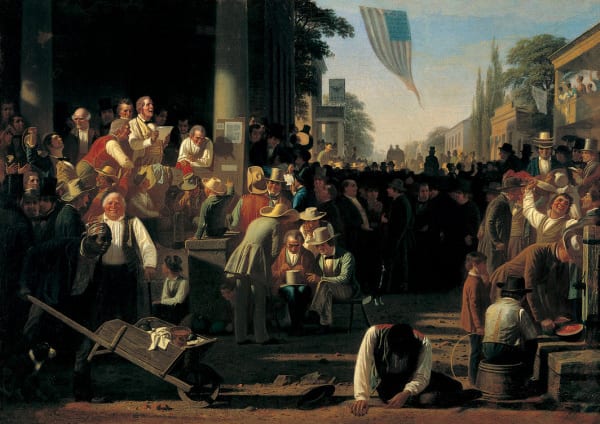This will be a proper time for making an observation or two on what may be called the preamble to this constitution. I had occasion, on a former day, to mention that the leading principle in the politics, and that which pervades the American constitutions, is, that the supreme power resides in the people. This Constitution, Mr. President, opens with a solemn and practical recognition of that principle: — “We, the people of the United States, in order to form a more perfect union, establish justice, etc., do ordain and establish this Constitution for the United States of America.” It is announced in their name—it receives its political existence from their authority: they ordain and establish. What is the necessary consequence? Those who ordain and establish have the power, if they think proper, to repeal and annul. A proper attention to this principle may, perhaps, give ease to the minds of some who have heard much concerning the necessity of a bill of rights.
Its establishment, I apprehend, has more force than a volume written on the subject. It renders this truth evident—that the people have a right to do what they please with regard to the government. I confess I feel a kind of pride in considering the striking difference between the foundation on which the liberties of this country are declared to stand in this Constitution, and the footing on which the liberties of England are said to be place. The Magna Charta of England is an instrument of high value to the people of that country. But, Mr. President, from what source does that instrument derive the liberties of the inhabitants of that kingdom? Let it speak for itself. The king says, “We have given and granted to all archbishops, bishops, abbots, priors, earls, barons, and to all the freemen of this our realm, these liberties following, to be kept in our kingdom of England forever.” When this was assumed as the leading principle of that government, it was no wonder that the people were anxious to obtain bills of rights, and to take every opportunity of enlarging and securing their liberties. But here, sir, the fee—simple remains in the people at large, and by this Constitution they do not part with it.
I am called upon to give a reason why the Convention omitted to add a bill of rights to the work before you. I confess, sir, I did think that, in point of propriety, the honourable gentleman ought first to have furnished some reasons to show such an addition to be necessary; it is natural to prove the affirmative of a proposition; and, if he had established the propriety of this addition, he might then have asked why it was not made.
I cannot say, Mr. President, what were the reasons of every member of that convention for not adding a bill of rights. I believe the truth is, that such an idea never entered the mind of many of them. I do not recollect to have heard the subject mentioned till within about three days of the time of our rising; and even then, there was no direct motion offered for any thing of the kind. I may be mistaken in this; but as far as my memory serves me, I believe it was the case. A proposition to adopt a measure that would have supposed that we were throwing into the general government every power not expressly reserved by the people, would have been spurned at, in that house, with the greatest indignation. Even in a single government, if the powers of the people rest on the same establishment as is expressed in this Constitution, a bill of rights is by no means a necessary measure. In a government possessed of enumerated powers, such a measure would be not only unnecessary, but preposterous and dangerous. Whence comes this notion, that in the United States there is no security without a bill of rights? Have the citizens of South Carolina not security for their liberties? They have no bill of rights. Are the citizens on the eastern side of the Delaware less free, or less secured in their liberties, than those on the western side? The state of New Jersey has no bill of rights. The state of New York has no bill of rights. The states of Connecticut and Rhode Island have no bill of rights. I know not whether I have exactly enumerated the states who have not thought it necessary to add a bill of rights to their constitution; but this enumeration, sir, will serve to show by experience, as well as principle, that even in single governments, a bill of rights is not an essential or necessary measure. But in a government consisting of enumerated powers such as is proposed for the United States, a bill of rights would not only be unnecessary, but in my humble judgment, highly imprudent. In all societies, there are many powers and rights which cannot be particularly enumerated. A bill of rights annexed to a constitution is an enumeration of the powers reserved. If we attempt an enumeration, everything that is not enumerated is presumed to be given. The consequence is, that an imperfect enumeration would throw all implied power into the scale of the government, and the rights of the people would be rendered incomplete. On the other hand, an imperfect enumeration of the powers of government reserves all implied power to the people; and by that means the constitution becomes incomplete. But of the two, it is much safer to run the risk on the side of the constitution; for an omission in the enumeration of the powers of government is neither so dangerous nor important as an omission in the enumeration of the rights of the people.



